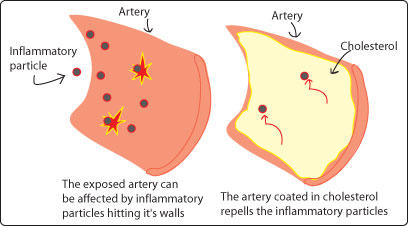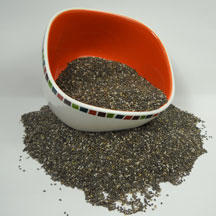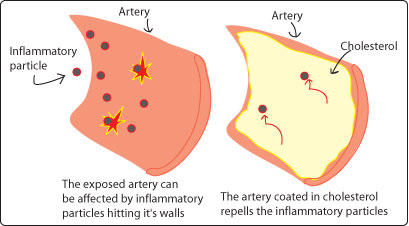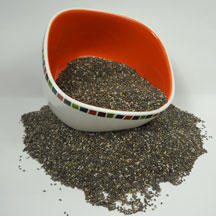



© 2008 www.mychiaseeds.com











Good fats, bad fats, inflammation & the chia seed
When a heart surgeon who has seen the insides of 5,000 people’s arteries has a “change
of heart” it’s definitely something to take note of!
Staying on top of modern health research is important (especially now, as more studies,
papers, tests & articles than ever before are being published) Especially if you want to
protect your health, and the health of the ones you care for. The doctor, Dwight Lundell,
actually caught onto something new and interesting. His suspicion?
Cholesterol on artery walls may be a side effect!
Instead of being a self-causing problem (like a broken bone) cholesterol build up may be
an over-zealous response to inflammation. Much like how an allergy is an over-done
response to something that’s usually harmless (pollen, pet dander, leaf mold etc)
cholesterol build up may be a similar over-reaction...or just a regular reaction.
Of course there’s endless reading to do when the topic is heart disease, cholesterol, and
heart-attacks. Heart disease is the #1 killer of people in the USA today, and it’s likely to
keep its top spot so long as no one changes their diet. Pharmaceutical companies would
love the answer to be ‘cut cholesterol’ that you are eating, and take some pills. But, what
if cholesterol build up on artery walls was only a SIDE EFFECT of something else going on
in the body?
Diagram:
Cholesterol coats the artery to protect it from
inflammation. The problem arises when
pieces of cholesterol break free, AND the
artery becomes clogged by it's own coating of
cholesterol.
What if it’s right?
What if cholesterol is such a problem “now more than ever” because of the modern menu? Inflammation causing
foods like alcohol, refined sugar, excess sugar, fiber-free processed grains, and an imbalance of omega 6 vs omega
3 oils could all be contributing factors in more inflammation...and according to the Doctor’s theory, more reason to
apply cholesterol to artery walls to try and block it.
To study this further, you need to understand inflammation.
Inflammation is a body’s natural reaction to some harmful substance. A bee-sting will certainly cause
inflammation of the surrounding tissue, until the poison and histamines are removed from the area. Inflammation
can be good—if only continued for short periods of time. The problem occurs when certain parts of the body are
frequently, or constantly inflamed. Then, instead of being beneficial, the inflammation turns to harm…and can
even be deadly.
In the case of the cholesterol side-effect, it’s the arteries of the body that are under attack from frequent
inflammation. Cholesterol is used by the body to coat the arteries and protect them from inflammation. The
problem is, this restricts blood flow and can cause dangerous pieces of this coating to break off and cause any
number of maladies. This is what people today see: cholesterol as the enemy, building up to “attack” people in
various ways.
What’s the real problem?
These low-carb, artificially sweetened, over-sweetened, omega-6 oil rich foods are actually the culprit in causing
inflammation in the arteries. The main enemies are simple carbohydrates found in processed foods (these turn to
sugars very quickly) , refined sugar, and omega 6 oils (oils that when out of balance produce cytokines, the
inflammatory molecules).
“What does all this have to do with inflammation? Blood sugar is controlled in a very narrow
range. Extra sugar molecules attach to a variety of proteins that in turn injure the blood
vessel wall. This repeated injury to the blood vessel wall sets off inflammation. When you
spike your blood sugar level several times a day, every day, it is exactly like taking sandpaper
to the inside of your delicate blood vessels. “
Dr. Dwight Lundell is the past Chief of Staff and Chief of Surgery at
Banner Heart Hospital, Mesa, AZ
While refined sugar and simple starches may be a bit easier to avoid, what about the omega 6 oil? Your body
DOES need some of it for healthy function, but it must be balanced with the healthy omega-3 oil. The ideal ratio
is more omega 3 than 6. However, with saturated fats, animal fats, and other sources of omega 3 being labeled
as “fattening” or “less healthy” the balance has been thrown off. Omega 6 fat also gives foods a longer shelf-life
which is best for the bottom line—not you!
The truth is, while omega-6 may look attractive on the surface (such as soy oil, sunflower oil, corn oil) due to
slower spoilage and being ‘unsaturated’, they’re actually behind a lot of the inflammation that’s keeping people
at risk.
“Animal fats contain less than 20% omega-6 and are much less likely to cause inflammation
than the supposedly healthy oils labeled polyunsaturated. Forget the "science" that has been
drummed into your head for decades. The science that saturated fat alone causes heart disease
is non-existent. The science that saturated fat raises blood cholesterol is also very weak. Since
we now know that cholesterol is not the cause of heart disease, the concern about saturated fat
is even more absurd today.”
So what’s the good news in all of this?
It’s not too late! Chances are, if you are reading this article, you CAN reverse some of the damage to your artery walls. And you can also prevent more inflammation from occurring in the future. When you cut out inflammation, you also stop the body’s need to plaster the artery walls with potentially harmful cholesterol. There are also many delicious solutions, and great reasons to raise omega-3 levels. Omega-3 may actually play a part in weight loss success! Jade Beutler an author of Understanding Fats & Oils says “Omega 3 fatty acids are gaining popularity with those looking to lose weight while attaining optimal health and the latest research has revealed numerous slimming secrets attributed to Omega-3s”. USA Weekend magazine also reports on a study where overweight dieters who included omega 3s in their eating plan lost 2 more pounds monthly than the control group, who did not.
First, eat greener:
Try to add more unprocessed foods to your diet. Fresh fruits and vegetables may have
carbohydrates, but they are mostly complex-carbohydrates. Even in the sweetest fruits,
these are broken down more slowly and blood sugar isn’t so heavily affected. Stay away
or minimize starchy foods like white breads and sugar-glazed cereals. The healthiest food
is the food that’s closest to its natural state. Grass fed beef, free-range chicken/turkey,
colorful fruits, squash, vegetables, nuts and seeds are the key to minimizing inflammation
so your natural healing process can take over.
Want to help balance your omega-3 and omega 6?
As you may know, fish and fish oil are rich in healthy omega-3 oils. But what if you don’t want fish every night?
Don’t like the idea of cod-liver-oil? Worried about fish absorbing harmful pollutants and spreading them to your
family? Or maybe, you want to follow the vegetarian path so that the oceans can recover from over-fishing. No
matter what your reason, Omega-3 just got a lot healthier and easier to add to your diet!

Enter, the Chia Seed
This tiny seed is nature’s richest plant-based source of omega-3 oil. By
weight, it is even richer than salmon, so every spoon full of chia can help
you tip the balance to the healthy omega-3 side. The best part is, there’s no
flavor. You can add these seeds to whatever you like (unlike fish!) to raise
your daily amount of omega-3. They’re also full of b-vitamins, more
calcium than milk, and more magnesium than broccoli…all with the taste of
whatever you’d like!
Next: “Waste” Your Cholesterol
The liver uses cholesterol. If you want less cholesterol, you can help your liver use it up by making bile-acid. Bile
acid is dispensed by the liver to help digest foods, but it requires cholesterol to make it. High fiber foods cause
the liver to dispense more bile acid. However, most modern menus include lots of refined foods that have had
the fiber removed. When you add fiber back into your diet, bile acid is used to try to proces it, then, it all gets
moved out through the colon. Chia seeds have so much fiber, both soluble and insoluble that you can actually
see it! Soluble fiber in plants is usually so small, as to be invisible to the naked eye...but when you wet chia
seeds with filterd water, you can see a small ‘halo’ around each one: this is the soluble fiber.
Feed the “good guys”
Harmful bacteria can also be a source of inflammation in the body. If cholesterol is going to be an effect of
inflammation of any sort, it’s important to try and stop it. Good bacteria, called probiotic bacteria help stamp
out the harmful ones. They also help you break down your food, meaning you get more nutrients. But, they
thrive when given soluble fiber. You may not be able to digest it, but probiotic bacteria can...and they’ll do their
job better when they’re well fed.
“Food of convenience” is part of the reason for this obesity and cholesterol epidemic. Easier, faster, tastier, and
longer-lasting has been the motto.
Chia Seeds may be the ultimate convenient food. What is easier than sprinkling a spoonful onto something you
were going to eat or drink anyway? What is more delicious than the best taste that YOU specify? And what
natural, uncooked, preservative free food lasts 2 years without refrigeration? Nothing else but ‘the chia seed’
can answer yes to all these questions.
The first step in changing your health is usually in changing your eating habits. Chia seeds make it easier to do
so, by packing in so many health benefits into a single, easy to use food. The convenience lure is very real.
People’s lives are much busier and temptation is around every corner, and that’s why it’s so important to have a
go-to food that’s both healthy and that you’re unable to get tired of.
Want some Chia Seeds? Get the best quality seeds with our Chia Seed Order Page or
You can read more Chia Articles This article can be read on Articles Base Want to learn more
about cholesterol and what Dr. Lundell has to say? Use The Great Cholesterol Lie The quote
above can be found in his book.
Heart surgeons’ change of heart?





© 2008 DBA Design Action MySeeds Chia
First, eat greener:
Try to add more unprocessed foods to your diet. Fresh fruits
and vegetables may have carbohydrates, but they are mostly
complex-carbohydrates. Even in the sweetest fruits, these are
broken down more slowly and blood sugar isn’t so heavily
affected. Stay away or minimize starchy foods like white
breads and sugar-glazed cereals. The healthiest food is the
food that’s closest to its natural state. Grass fed beef, free-
range chicken/turkey, colorful fruits, squash, vegetables, nuts
and seeds are the key to minimizing inflammation so your
natural healing process can take over.

When a heart surgeon who has seen the insides of 5,000 people’s
arteries has a “change of heart” it’s definitely something to take note
of!
Staying on top of modern health research is important (especially
now, as more studies, papers, tests & articles than ever before are
being published) Especially if you want to protect your health, and the
health of the ones you care for. The doctor, Dwight Lundell, actually
caught onto something new and interesting. His suspicion?
Cholesterol on artery walls may be a side effect!
Instead of being a self-causing problem (like a broken bone)
cholesterol build up may be an over-zealous response to
inflammation. Much like how an allergy is an over-done response to
something that’s usually harmless (pollen, pet dander, leaf mold etc)
cholesterol build up may be a similar over-reaction...or just a regular
reaction.
Of course there’s endless reading to do when the topic is heart
disease, cholesterol, and heart-attacks. Heart disease is the #1 killer of
people in the USA today, and it’s likely to keep its top spot so long as
no one changes their diet. Pharmaceutical companies would love the
answer to be ‘cut cholesterol’ that you are eating, and take some pills.
But, what if cholesterol build up on artery walls was only a SIDE
EFFECT of something else going on in the body?

Diagram:
Cholesterol coats the artery to protect it from inflammation. The
problem arises when pieces of cholesterol break free, AND the artery
becomes clogged by it's own coating of cholesterol.
Heart Surgeon’s Change of Heart!
Good Fats, Bad Fats, Inflammation
& The Chia Seed
What if it’s right?
What if cholesterol is such a problem “now more than ever” because
of the modern menu? Inflammation causing foods like alcohol,
refined sugar, excess sugar, fiber-free processed grains, and an
imbalance of omega 6 vs omega 3 oils could all be contributing
factors in more inflammation...and according to the Doctor’s theory,
more reason to apply cholesterol to artery walls to try and block it.
To study this further, you need to understand inflammation.
Inflammation is a body’s natural reaction to some harmful substance.
A bee-sting will certainly cause inflammation of the surrounding
tissue, until the poison and histamines are removed from the area.
Inflammation can be good—if only continued for short periods of
time. The problem occurs when certain parts of the body are
frequently, or constantly inflamed. Then, instead of being beneficial,
the inflammation turns to harm…and can even be deadly.
In the case of the cholesterol side-effect, it’s the arteries of the body
that are under attack from frequent inflammation. Cholesterol is
used by the body to coat the arteries and protect them from
inflammation. The problem is, this restricts blood flow and can cause
dangerous pieces of this coating to break off and cause any number
of maladies. This is what people today see: cholesterol as the enemy,
building up to “attack” people in various ways.
What’s the real problem?
These low-carb, artificially sweetened, over-sweetened, omega-6 oil
rich foods are actually the culprit in causing inflammation in the
arteries. The main enemies are simple carbohydrates found in
processed foods (these turn to sugars very quickly) , refined sugar,
and omega 6 oils (oils that when out of balance produce cytokines,
the inflammatory molecules).
“What does all this have to do with inflammation? Blood sugar is
controlled in a very narrow range. Extra sugar molecules attach to a
variety of proteins that in turn injure the blood vessel wall. This
repeated injury to the blood vessel wall sets off inflammation. When
you spike your blood sugar level several times a day, every day, it is
exactly like taking sandpaper to the inside of your delicate blood
vessels. “
Dr. Dwight Lundell is the past Chief of Staff and Chief of Surgery
at
Banner Heart Hospital, Mesa, AZ
While refined sugar and simple starches may be a bit easier to avoid,
what about the omega 6 oil? Your body DOES need some of it for
healthy function, but it must be balanced with the healthy omega-3
oil. The ideal ratio is more omega 3 than 6. However, with saturated
fats, animal fats, and other sources of omega 3 being labeled as
“fattening” or “less healthy” the balance has been thrown off. Omega
6 fat also gives foods a longer shelf-life which is best for the bottom
line—not you!
The truth is, while omega-6 may look attractive on the surface (such
as soy oil, sunflower oil, corn oil) due to slower spoilage and being
‘unsaturated’, they’re actually behind a lot of the inflammation that’s
keeping people at risk.
“Animal fats contain less than 20% omega-6 and are much less
likely to cause inflammation than the supposedly healthy oils
labeled polyunsaturated. Forget the "science" that has been
drummed into your head for decades. The science that saturated
fat alone causes heart disease is non-existent. The science that
saturated fat raises blood cholesterol is also very weak. Since we
now know that cholesterol is not the cause of heart disease, the
concern about saturated fat is even more absurd today.”
So what’s the good news in all of this?
It’s not too late! Chances are, if you are reading this article, you CAN reverse some of the damage to your artery walls. And you can also prevent more inflammation from occurring in the future. When you cut out inflammation, you also stop the body’s need to plaster the artery walls with potentially harmful cholesterol. There are also many delicious solutions, and great reasons to raise omega-3 levels. Omega-3 may actually play a part in weight loss success! Jade Beutler an author of Understanding Fats & Oils says “Omega 3 fatty acids are gaining popularity with those looking to lose weight while attaining optimal health and the latest research has revealed numerous slimming secrets attributed to Omega-3s”. USA Weekend magazine also reports on a study where overweight dieters who included omega 3s in their eating plan lost 2 more pounds monthly than the control group, who did not.
Want to help balance your omega-3 and omega 6?
As you may know, fish and fish oil are rich in healthy omega-3 oils.
But what if you don’t want fish every night? Don’t like the idea of cod-
liver-oil? Worried about fish absorbing harmful pollutants and
spreading them to your family? Or maybe, you want to follow the
vegetarian path so that the oceans can recover from over-fishing. No
matter what your reason, Omega-3 just got a lot healthier and easier
to add to your diet!
Enter, the Chia Seed
This tiny seed is nature’s richest
plant-based source of omega-3 oil.
By weight, it is even richer than
salmon, so every spoon full of chia
can help you tip the balance to the
healthy omega-3 side. The best
part is, there’s no flavor. You can
add these seeds to whatever you
like (unlike fish!) to raise your daily
amount of omega-3. They’re also full of b-vitamins, more calcium
than milk, and more magnesium than broccoli…all with the taste of
whatever you’d like!

Next: “Waste” Your Cholesterol
The liver uses cholesterol. If you want less cholesterol, you can help
your liver use it up by making bile-acid. Bile acid is dispensed by the
liver to help digest foods, but it requires cholesterol to make it. High
fiber foods cause the liver to dispense more bile acid. However, most
modern menus include lots of refined foods that have had the fiber
removed. When you add fiber back into your diet, bile acid is used to
try to proces it, then, it all gets moved out through the colon. Chia
seeds have so much fiber, both soluble and insoluble that you can
actually see it! Soluble fiber in plants is usually so small, as to be
invisible to the naked eye...but when you wet chia seeds with filterd
water, you can see a small ‘halo’ around each one: this is the soluble
fiber.
Feed the “good guys”
Harmful bacteria can also be a source of inflammation in the body. If
cholesterol is going to be an effect of inflammation of any sort, it’s
important to try and stop it. Good bacteria, called probiotic bacteria
help stamp out the harmful ones. They also help you break down
your food, meaning you get more nutrients. But, they thrive when
given soluble fiber. You may not be able to digest it, but probiotic
bacteria can...and they’ll do their job better when they’re well fed.
“Food of convenience” is part of the reason for this obesity and
cholesterol epidemic. Easier, faster, tastier, and longer-lasting has
been the motto.
Chia Seeds may be the ultimate convenient food. What is easier than
sprinkling a spoonful onto something you were going to eat or drink
anyway? What is more delicious than the best taste that YOU specify?
And what natural, uncooked, preservative free food lasts 2 years
without refrigeration? Nothing else but ‘the chia seed’ can answer yes
to all these questions.
The first step in changing your health is usually in changing your
eating habits. Chia seeds make it easier to do so, by packing in so
many health benefits into a single, easy to use food. The convenience
lure is very real. People’s lives are much busier and temptation is
around every corner, and that’s why it’s so important to have a go-to
food that’s both healthy and that you’re unable to get tired of.
Want some Chia Seeds? Get the best quality seeds with our Chia
Seed Order Page or
You can read more Chia Articles This article can be read on Articles
Base Want to learn more about cholesterol and what Dr. Lundell
has to say? Use The Great Cholesterol Lie The quote above can be
found in his book.








